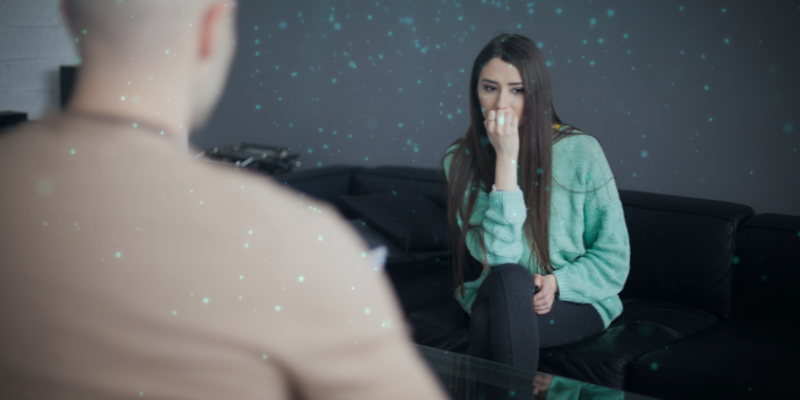
America is an anxious nation, with anxiety rates rising to over 35% during the pandemic. This led to a 34% increase in prescriptions for anti-anxiety medications such as benzodiazepines. That’s bad news for your brain and overall well-being, according to an explosive 2023 study. The new survey of over 1,200 people, which appeared in Plos One, found that benzos have devastating life consequences for some people, even after they stop using them.
Benzos are bad news for your brain and overall well-being, according to an explosive 2023 study. Click To Tweet
WHAT ARE BENZOS?
Benzodiazepines are a type of drug that enhances the effects of a neurotransmitter called gamma-aminobutyric acid (GABA). This neurochemical is known to have a calming effect on the brain and body. Benzos are some of the most frequently prescribed medications in the U.S., with over 30 million Americans using them in the past year.
The Food and Drug Administration has approved benzodiazepine use for the treatment of a variety of conditions, including:
- Generalized anxiety disorder (GAD)
- Social anxiety disorder
- Panic attacks
- Insomnia
- Epilepsy and other seizure disorders
Physicians may also prescribe benzos “off-label” for other issues, such as:
- Bipolar disorder
- Other sleep disorders
- Tourette syndrome and other tic disorders
- Withdrawal from alcohol use
Some of the different types of benzos include:
- Alprazolam (Xanax)
- Diazepam (Valium)
- Lorazepam (Ativan)
- Clonazepam (Klonopin)
- Midazolam (Versed)
CONSEQUENCES OF USING ANTI-ANXIETY BENZOS
Benzodiazepine use is associated with several emotional, cognitive, and physical consequences that impair quality of life. The team of researchers from the University of Colorado Anschutz Medical Campus who conducted the survey mentioned above have proposed the name benzodiazepine-induced neurological dysfunction (BIND) for these negative symptoms.
The survey reveals that these consequences occur not only while taking benzos, but also continue after a person stops taking the medication. For 77% of the participants, symptoms persisted for months or more than a year after discontinuation.
Symptoms associated with the use of benzos that lasted longer than one year in more than 50% of the survey respondents include:
- Anxiety/nervousness
- Sleep problems
- Reduced energy
- Trouble focusing
- Memory issues
- Sensitivity to sounds and light
- Digestive problems
- Issues related to consuming certain foods and beverages
- Muscle weakness
- Physical aches and pains
The presence of these symptoms came as no surprise to the study coauthor, cardiologist, and director of Benzodiazepine Information Coalition Christy Huff, MD. “Patients have been reporting long-term effects from benzodiazepines for over 60 years. I am one of those patients. Even though I took my medication as prescribed, I still experience symptoms on a daily basis at 4 years off benzodiazepines,” said Dr. Huff in a news release.
What’s especially disturbing is that these symptoms were often new problems unrelated to the issues that led to a prescription for anti-anxiety pills. The most frequently cited reasons leading to a prescription included:
- Situational anxiety (44%)
- Insomnia (40%)
- Panic attacks (40%)
- Depression (33%)
- Generalized anxiety disorder (24%)
However, the persistent symptoms arising while using benzos, while tapering off the drug, or after discontinuation were often different from these initial issues.
NEGATIVE LIFE IMPACTS RELATED TO THE USE OF BENZODIAZEPINES
The lasting consequences of using benzos go even further, according to the study in Plos One.
More than 90% of the survey respondents said that they have experienced at least one lasting negative impact in their life due to the use of benzodiazepines.
The adverse life events most often experienced due to benzo use or withdrawal included:
- Significantly impacted relationship with spouse and/or others – 57%
- Suicidal ideation and/or attempts – 54%
- Losing a job, getting fired, or becoming unable to work – 47%
- Significant rise in medical bills – 41%
- Reduction in income or lower income due to reduced job capacity – 33%
- Losing savings or retirement funds – 27%
- Violent thoughts and/or acts – 24%
- Losing one’s home – 13%
- Losing a business (if a business owner) – 8%
- Losing custody of a child – 3%
Alarmingly, over 79% of the survey participants said they experienced between 6 and 13 adverse life impacts. For more than 53% of the respondents, benzo use or withdrawal led to 8 or more negative life issues.
In terms of how much the use of benzos impacted their personal and/or work life, the vast majority said it caused “severe, quite severe, or enormous problems.” Specifically, they reported significant problems in the following areas:
- Fun, recreation, hobbies: 84%
- Work-life – 79%
- Social interaction, friendships – 77%
- Ability to take care of home/others – 73%
- Relationships with spouse/family – 69%
- Ability to walk/drive – 56%
As you can see from these findings, these drugs can impact nearly every aspect of your life.
HOW COMMON IS BENZODIAZEPINE-INDUCED NEUROLOGICAL DYSFUNCTION?
According to the study, an estimated 20% of long-time benzo users develop BIND. These negative effects can occur while using benzos, while tapering off, or after discontinuation. As of now, it remains unclear why some people develop adverse consequences related to the use of benzos while others do not.
BENZOS AND BRAIN HEALTH CONSEQUENCES
The brain-imaging work at Amen Clinics provides additional proof that taking benzodiazepines damages the brain. Based on the Amen Clinics database of over 225,000 brain SPECT scans, it is clear that these commonly prescribed anti-anxiety medications are bad for your brain.
SPECT is a brain-imaging technology that measures blood flow and activity in the brain. In a healthy brain, blood flow and activity are full, even, and symmetrical. SPECT scans of people taking benzos, however, show unhealthy brain patterns with overall low blood flow and a bumpy, scalloped appearance.
This pattern on SPECT is frequently seen in the following instances:
- Exposure to toxins (including illegal drugs, some prescription medications, or alcohol)
- Exposure to environmental toxins
- Infections (such as Lyme disease or COVID)
- Hypothyroidism
- Carbon monoxide poisoning (commonly seen in firefighters)
- Anoxia (such as near drowning incidents or a heart attack when a person stops breathing)
- Severe anemia
- Chemotherapy
Other brain-related issues include memory problems and changes in the reward system. For example, long-term use of benzos has been associated with an increased risk of dementia, according to research. And the drugs alter the function in the reward system, making them highly addictive.
A functional brain scan, such as SPECT, can be very helpful in understanding if benzodiazepine use or withdrawal is contributing to a person’s symptoms.
HOW TO STOP TAKING BENZOS
Because benzodiazepines cause so many consequences, it’s important to find a way to leave them behind. In working with tens of thousands of patients at Amen Clinics, it has become apparent that it can be very hard to stop taking them.
Unfortunately, when some people attempt to discontinue use or taper off, they choose to self-medicate in other unhealthy ways. These include drinking alcohol, taking opioids, or taking other types of depressant medications. Some individuals may turn to “designer benzodiazepines,” a new class of psychoactive substances that are not approved for use in the U.S. and that have dangerous side effects.
To stop taking benzos, work closely with your physician. One of the best strategies is to start incorporating natural anti-anxiety solutions to help ward off anxiousness while in the process of tapering.
Anxiety, panic disorder, and other mental health issues can’t wait. At Amen Clinics, we’re here for you. We offer in-clinic brain scanning and appointments, as well as mental telehealth, clinical evaluations, and therapy for adults, teens, children, and couples. Find out more by speaking to a specialist today at 888-288-9834 or visit our contact page here.





Thank you for shedding some light on this. I am always so appreciative of dr amens work. I, too am a survivor of benzodiazepines. I took my last dose almost 5 years ago and my brain and body are still very much worse than before the benzos. I have lost most quality of life and still have many difficulties at almost 5 years off of the medication.
Comment by Michelle — August 25, 2023 @ 4:29 AM
I have been taking .5 colonapin
For a few months
I never take the whole pill only 1/2
Or 1/4
Going through some hip issues for over a year and dealing with a son who has depression
I don’t want things to get worse
Comment by Vicki wilson — August 25, 2023 @ 5:29 AM
How any and what does causes the problem? What if you don't take enough to require tapering off? What if you take an average of 3 per month? At what dose and frequency of use did the study cover? Too many unanswered questions for this article to have real value.
Comment by SuzieQue — August 25, 2023 @ 6:34 AM
I appreciate your findings but it is basically a study. For those struggling to cope & dealing with trauma, grief, etc, some of these meds, such as Ativan, are life savers. When one is so broken, even functioning is hard & Ativan doesn't alter the mind but allows you to do things you have to without being paralyzed or breaking down every few mins.
Unfortunately studies like these make Doctors more reluctant to prescribe them. Yes we don't want abuse but for those that need them, we don't need yet another struggle or to be denied & feel like there is no hope. Thank you.
Comment by A. — August 25, 2023 @ 12:43 PM
Just curious if its ok to take 1mg valium occasionally (like once every week or two). I must admit sometimes it helps me sleep if I have an important appointment etc.
Comment by emily — August 25, 2023 @ 2:25 PM
I had a micronutrient test done. Found out I was low in B6, lithium and tryptophan. I now supplement daily with B6, 5 HTP and lithium ornate under the direction of my functional medical Dr.
Comment by Renée — August 25, 2023 @ 8:16 PM
I have not observed any mental deteriation or adverse life style consqenced of the use or cessation of benzos.
Comment by George kiracofe md — August 26, 2023 @ 9:09 AM
I do not agree with your study!
Comment by Joy — August 26, 2023 @ 10:36 AM
i have had GAD for over 30 years ,i've tried pharma gaba it works for about 2-3 weeks , i've been in counceling for 2 years for the gad, with some relief , clonazapam works but affects my memory and motiveation . what med / supplement might workbetter please help
Comment by roy davis — August 28, 2023 @ 7:35 AM
finding a doctor to help me get off tamazepam for sleep has been impossible for me.
Comment by Julie W — September 20, 2023 @ 6:36 AM
Wonderful site. Plenty of useful information here. I am sending it to several friends ans also sharing in delicious. And naturally, thanks for your sweat!
Comment by gralion torile — November 22, 2023 @ 10:15 PM
Very well written story. It will be beneficial to anybody who usess it, including yours truly :). Keep doing what you are doing – i will definitely read more posts.
Comment by graliontorile — November 27, 2023 @ 4:09 PM